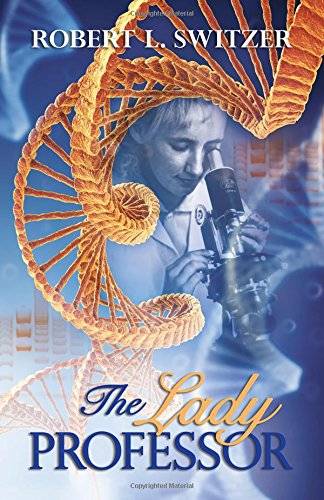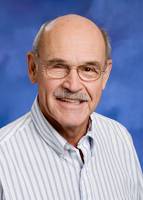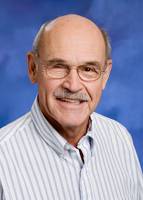It is not unusual for a professor in the University of Illinois’ English department to publish a novel.
It is a bit unusual, however, for a professor from the School of Molecular and Cellular Biology to publish a novel.
Robert “Bob” Switzer, a professor emeritus of biochemistry, has done just that.
In 2008, after he closed his lab at age 68 and 40 years of research and education in biochemistry and microbiology, Switzer switched his focused to creative writing. Recently, Switzer published his debut novel The Lady Professor (by Bedazzled Ink, an independent press in California).

His transition into creative writing started shortly before his retirement. He had revisited a few short stories he had written in graduate school in the 60s then got the idea to write a book about his family farm.
“That was a good way to get going,” he said, “You don’t have to invent the characters, you just have to invent the story.”
The Center for American Places at Columbia College in Chicago published in 2012 his memoir A Family Farm: Life on an Illinois Dairy Farm.
Why the switch to create writing?
“It’s a compulsion,” he said. “I love doing it. It’s deeply satisfying when it goes well. Even the frustration is tolerable. You need a creative outlet.”
Switzer, who earned a B. S. in Chemistry from the University of Illinois in 1961, a Ph.D. in Biochemistry from the University of California, Berkeley in 1966, and joined the University of Illinois faculty in 1968, had used science has his creative outlet.
But once he closed his laboratory, he was done.
 “I was not a theoretical scientist,” Switzer said. “I had to do experiments, so there was this enormous vacuum, and I needed some way to fill.”
“I was not a theoretical scientist,” Switzer said. “I had to do experiments, so there was this enormous vacuum, and I needed some way to fill.”
Switzer is currently working on a new novel and a collection of short stories.
For nearly 12 years, he has been part a C-U writers’ group, where he is able to get feedback, and he considers the interaction with other writers invaluable.
“I really do benefit from this writers’ workshop,” Switzer said. “I know I am succeeding when they start arguing among themselves would argue among themselves what a character would and wouldn’t do what I am having them do. I listen carefully, and I’d say I reject their advice about half the time, but the other half, I take very very seriously.”
In one instant, the women in the writers’ group called him out about his main character and she hadn’t thought about what she was wearing to an important job interview with a college Dean.
“The broader conclusion I draw from my experience is that retirement is not to be dreaded,” he said. “Rather, it is an opportunity to awaken dormant interests and talents, a time for new growth and self-discovery, an opening to a more relaxed second career.”
The Lady Professor (synopsis below) can be purchased from Bedazzled Ink or Amazon.
“Can a poor farm girl born in 1900 with exceptional scholastic ability and a deep fascination with the natural world fight her way through college and graduate school, become a college professor and conduct groundbreaking research, even though poverty, her family’s indifference and institutional obstacles and prejudices against women, universal at the time, stand in her way?
Emma Hansen eventually manages to secure a faculty position at Harrington College, a small college in Ohio, but at the cost of alienation from her family and a disappointing love life. At Harrington College Emma is a popular teacher, but ignites controversy by lecturing against eugenics and offering a frank course in human sexuality.
In the lab Emma and Joe Bellafiori, a young chemist who becomes her lover and husband, slowly unlock important secrets of genetic expression. However, chicanery on the part of a prominent competing scientist delays publication of their work until he can publish his research first and later win the Nobel Prize.
When Joe is killed in World War II, Emma and their young son are left alone. Emma becomes a respected figure on campus and achieves modest recognition for her research, but at the end of her life she” asks her granddaughter, a medical researcher, to publish evidence of the misconduct that robbed her and Joe of the honor they had earned. It will create a scandal; dare she do it?








